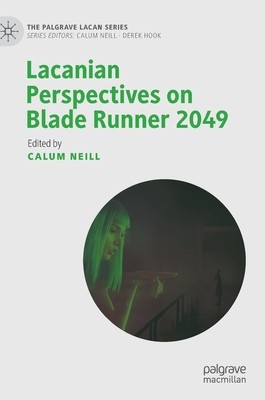
- Išsiųsime per 10–14 d.d.
- Leidėjas: Palgrave Macmillan
- Metai: 2021
- Puslapiai: 234
- ISBN-10: 3030567532
- ISBN-13: 9783030567538
- Formatas: 14.8 x 21 x 1.6 cm, kieti viršeliai
- Kalba: Anglų
- Extra -15 % nuolaida šiai knygai su kodu: ENG15
Lacanian Perspectives on Blade Runner 2049 + nemokamas atvežimas! | knygos.lt
Atsiliepimai
Aprašymas
This book provides a collection of Lacanian responses to Denis Villeneuve's Blade Runner 2049 from leading theorists in the field.Like Ridley Scott's original Blade Runner film, its sequel is now poised to provoke philosophical and psychoanalytic arguments, and to provide illustrations and inspiration for questions of being and the self, for belief and knowledge, the human and the post-human, amongst others. This volume forms the vanguard of responses from a Lacanian perspective, satisfying the hunger to extend the theoretical considerations of the first film in the various new directions the second film invites. Here, the contributors revisit the implications of the human-replicant relationship but move beyond this to consider issues of ideology, politics, and spectatorship.
This exciting collection will appeal to an educated film going public, in addition to students and scholars of Lacanian psychoanalysis, psychoanalytic theory, cultural studies, film theory, philosophy and applied psychoanalysis.
EXTRA 15 % nuolaida su kodu: ENG15
Akcija baigiasi už 7d.08:16:46
Nuolaidos kodas galioja perkant nuo 10 €. Nuolaidos nesumuojamos.

- Leidėjas: Palgrave Macmillan
- Metai: 2021
- Puslapiai: 234
- ISBN-10: 3030567532
- ISBN-13: 9783030567538
- Formatas: 14.8 x 21 x 1.6 cm, kieti viršeliai
- Kalba: Anglų
Like Ridley Scott's original Blade Runner film, its sequel is now poised to provoke philosophical and psychoanalytic arguments, and to provide illustrations and inspiration for questions of being and the self, for belief and knowledge, the human and the post-human, amongst others. This volume forms the vanguard of responses from a Lacanian perspective, satisfying the hunger to extend the theoretical considerations of the first film in the various new directions the second film invites. Here, the contributors revisit the implications of the human-replicant relationship but move beyond this to consider issues of ideology, politics, and spectatorship.
This exciting collection will appeal to an educated film going public, in addition to students and scholars of Lacanian psychoanalysis, psychoanalytic theory, cultural studies, film theory, philosophy and applied psychoanalysis.




Atsiliepimai